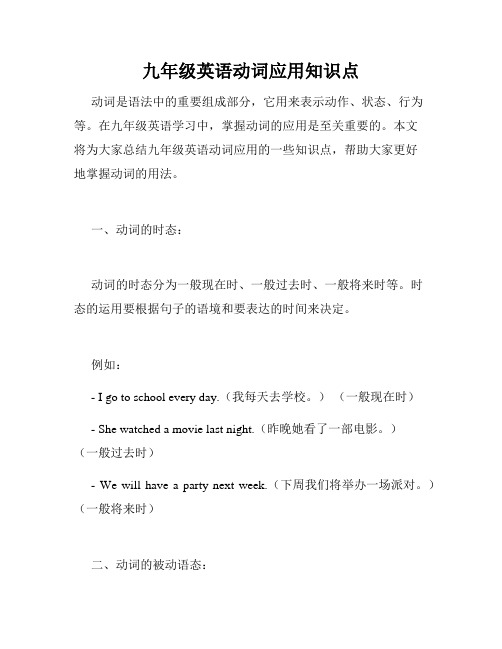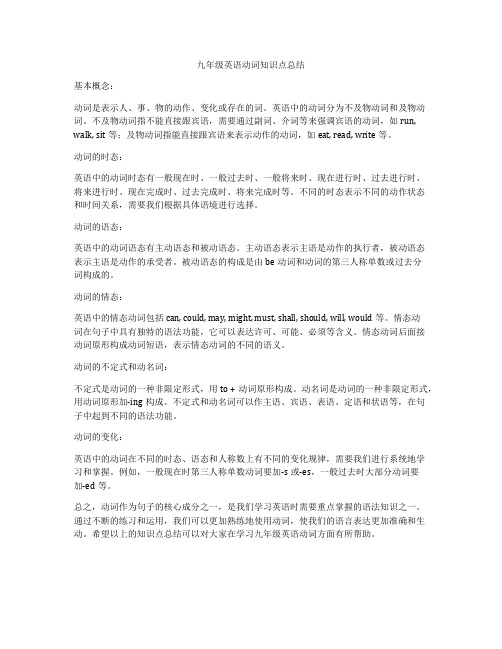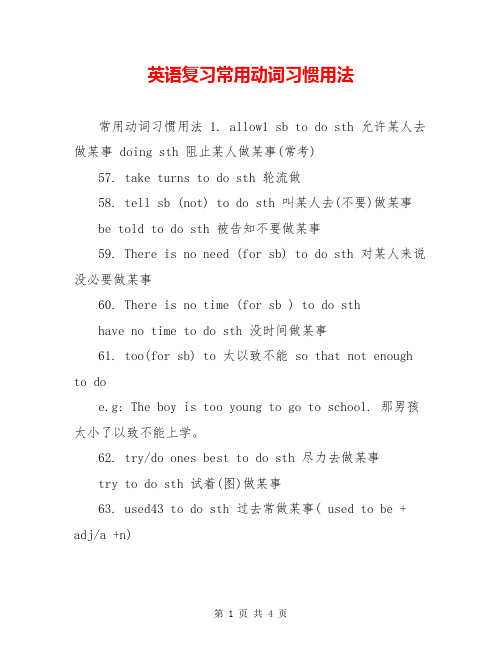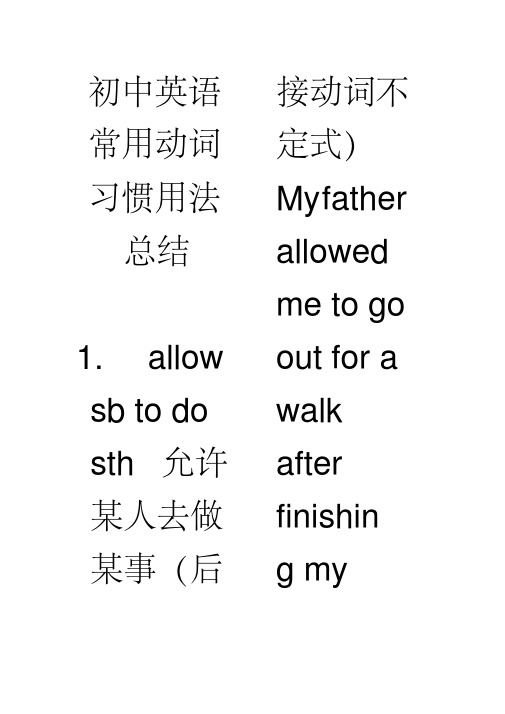初三英语复习材料常用动词习惯用法new
九年级英语动词应用知识点

九年级英语动词应用知识点动词是语法中的重要组成部分,它用来表示动作、状态、行为等。
在九年级英语学习中,掌握动词的应用是至关重要的。
本文将为大家总结九年级英语动词应用的一些知识点,帮助大家更好地掌握动词的用法。
一、动词的时态:动词的时态分为一般现在时、一般过去时、一般将来时等。
时态的运用要根据句子的语境和要表达的时间来决定。
例如:- I go to school every day.(我每天去学校。
)(一般现在时)- She watched a movie last night.(昨晚她看了一部电影。
)(一般过去时)- We will have a party next week.(下周我们将举办一场派对。
)(一般将来时)二、动词的被动语态:被动语态是表示主语是动作的承受者而不是动作的执行者的句子结构。
在被动语态中,动作的执行者通常由介词by或者省略不表达。
例如:- The book was written by a famous author.(这本书是一位著名作家写的。
)- The flowers have been watered by the gardener.(花朵已经被园丁浇水了。
)三、动词的不定式和动名词形式:不定式通常由to+动词原形构成,它可以作为名词、形容词或副词的补语、定语等。
例如:- I want to play basketball with my friends.(我想和我的朋友们打篮球。
)(不定式作为动词的宾语)- He is too young to go to school.(他太小了,还不能上学。
)(不定式作为形容词补语)- She went to the park to walk her dog.(她去公园遛狗。
)(不定式作为目的状语)动名词是动词+ing形式,它可以作为名词、主语、宾语、定语等。
例如:- Swimming is my favorite sport.(游泳是我最喜欢的运动。
九年级英语动词知识点总结

九年级英语动词知识点总结基本概念:动词是表示人、事、物的动作、变化或存在的词。
英语中的动词分为不及物动词和及物动词。
不及物动词指不能直接跟宾语,需要通过副词、介词等来强调宾语的动词,如run, walk, sit等;及物动词指能直接跟宾语来表示动作的动词,如eat, read, write等。
动词的时态:英语中的动词时态有一般现在时、一般过去时、一般将来时、现在进行时、过去进行时、将来进行时、现在完成时、过去完成时、将来完成时等。
不同的时态表示不同的动作状态和时间关系,需要我们根据具体语境进行选择。
动词的语态:英语中的动词语态有主动语态和被动语态。
主动语态表示主语是动作的执行者,被动语态表示主语是动作的承受者。
被动语态的构成是由be动词和动词的第三人称单数或过去分词构成的。
动词的情态:英语中的情态动词包括can, could, may, might, must, shall, should, will, would等。
情态动词在句子中具有独特的语法功能,它可以表达许可、可能、必须等含义。
情态动词后面接动词原形构成动词短语,表示情态动词的不同的语义。
动词的不定式和动名词:不定式是动词的一种非限定形式,用to + 动词原形构成。
动名词是动词的一种非限定形式,用动词原形加-ing构成。
不定式和动名词可以作主语、宾语、表语、定语和状语等,在句子中起到不同的语法功能。
动词的变化:英语中的动词在不同的时态、语态和人称数上有不同的变化规律,需要我们进行系统地学习和掌握。
例如,一般现在时第三人称单数动词要加-s或-es,一般过去时大部分动词要加-ed等。
总之,动词作为句子的核心成分之一,是我们学习英语时需要重点掌握的语法知识之一。
通过不断的练习和运用,我们可以更加熟练地使用动词,使我们的语言表达更加准确和生动。
希望以上的知识点总结可以对大家在学习九年级英语动词方面有所帮助。
九年级英语动词知识点总结

九年级英语动词知识点总结动词作为英语中的核心语法成分之一,在学习英语时起到了至关重要的作用。
掌握动词的正确用法及相关知识点,是学习英语的基础之一。
本文将全面总结九年级英语动词的知识点,帮助读者深入理解并正确运用动词。
一、动词的基本概念与分类动词是表示人、事物或现象的变化、行为或状态的词语。
根据动词的用法和意义,可以将动词分为不同的类别。
以下是常见的动词分类:1.实义动词(Main Verbs)实义动词是句子的谓语,用以表示具体的动作、状态或者感觉。
例如:- 动作动词(Action Verbs):run(跑)、eat(吃)、dance(跳舞)- 感官动词(Sensory Verbs):see(看见)、hear(听见)、smell(闻到)- 心理动词(Mental Verbs):think(思考)、believe(相信)、remember(记得)2.系动词(Linking Verbs)系动词用来连接主语和表语,表示主语的状态或特征。
常见的系动词有:be(是)、seem(看起来)、appear(出现)、feel(感觉)等。
3.助动词(Auxiliary Verbs)助动词用于构成句子的时态、语态、否定形式等,并且不能单独作谓语。
常见的助动词有:be(am, is, are)、do(does, did)和have(has, have)等。
二、动词的时态和语态时态和语态是动词的重要属性,它们能够表达动作发生的时间和动作的主动或被动关系。
以下是时态和语态的具体介绍:1.时态(Tense)时态指动作发生的时间,共有以下几种时态:- 一般现在时(Simple Present):表示经常性、习惯性的动作或客观事实。
- 一般过去时(Simple Past):表示过去发生的具体动作或存在的状态。
- 现在进行时(Present Continuous):表示现在正在进行的动作。
- 过去进行时(Past Continuous):表示过去某个时间正在进行的动作。
初三英语复习材料常用动词习惯用法

初三英语复习材料常用动词习惯用法常用动词习惯用法 1. allow sb to do sth 允许某人去做某事My father allowed me to go out for a walk after finishing my homework.2. asked sb (not) to do sth 叫某人做事某事My father asked me to study hard.He asked me not to swim alone.be asked to do sth 被叫去做某事/被邀请去做某事I was asked to have a dinner with them yesterday.3. be afraid to do sth 害怕做某事She is afraid to ask me questions.4. be afaid of doing sth 害怕做某事I am afraid of going out at night.5. be afaid of sth 害怕某物He is afraid of snakes.6. be amazed to do sth 对做某事感到惊讶He was amazed to meet the girl there. be amazed at sth 对某事感到惊讶they were amazed at the news.7. be busy doing/with sth 忙于做某事: I was busy washing my car at that time. 那时候我正忙于清洗我的车子。
I am busy with my work.8. be coming/going/leaving/fiying/moving/dy ingthe bus is coming/the dog is dying. 9. be excited to do sth 对做……感到兴奋Jacky was excited to travel there by plane.be excited at sthLily was excited at his words.be excited about doing sthhe was excited about passing the exam without going overing books.10. be frightened to do sth 害怕去做某事Sam is frightened to ride a horse. 11. be glad/happy to do sth 高兴去做某事she is happy to clean the blackboard with me.be pleased to do sth高兴做某事she was pleased to help the old man yesterday.be pleased with sth 对某事感到高兴/满意the teacher was pleased with my answer.12. be interested in sth/doing sth 对某事感兴趣/对做某事感兴趣she is interested in swimming in the river.My btother is interested in Chinese.13. be/get ready for/to do sthBe ready for sth 为某事做好了准备We are ready for the exam.Be ready to do sth 为做某事做好了准备We are ready to have a birthday party for her.get ready for sth为某事在做准备We are getting ready for the exam.get ready for sth 为做某事而做准备13. be sorry to do sth 对做某事感到抱歉14. be surprised to do sth 对做某事感到惊奇be surprised at sth 对某事感到惊奇15. be worth doing sth 值得做某事16. begin to do sthbegin/start to do/doing sth ( 开始去做某事 )17. can/be able to afford (to buy) sth 有能力购买……18. can/may/must do sth could/would/should/might do sth19. can’t wait to do sth 迫不急待地去做某事20. decide to do sth 决定去做某事make up one’s mind to do sth 下决心去做某事make a decision to do sth 对做某事作出决定21. deserve to do sth 值得/应该做……22. encourage sb to do sth 鼓励某人去做某事23. enjoy doing sth 乐意去做某事24. expect (sb) to do sth 期望去做某事25. fail to do sth 做某事失败succeed doing sth 成功做了某事26. finish doing sth 做完某事27. follow sb to do sth 跟随某人去做某事28. get sb to do sthmake sb do sthlet sb do sth (让某人做某事)29. get/have a chance to do sth 得到一个做某事的机会30. give/pass/show/lend/sell sb sth/sth to sbbuy/get/bring sb sth/sth for sb31. go on to do sth 继续做事go on doing sth 继续做事32. hate to do/doing sth 讨厌/不喜欢做某事33. have fun doing sth34. have problems doing sth 做某事遇到困难35. have sb do sthhave sth donehave sth to do 工有事要做36. hear sb do sth 听到某人做某事hear sb doing sth 听到某人正在做某事37. help to do sth 帮忙做某事help sb (to) do sth 帮助某人做某事38. hope/wish to do sth 希望做某事wish sb to do sth 希望某人做某事39. I t seems that 这像是……seem to do sthseem +adj40. It’s + adj+(for sb) to do sth . It’s+adj +(of sb) to do sth: It’s glad for him to hear the news.41. It takes sb some time/money todo sth . 花费某人多长时间做某事42. pay …for… cost spend…on….. it take …to do sth43. It’s best for sb to do sth. 对某人来说做某事是最好的had better do sth 最好做某事44. It’s time for sb to do sth 是某人做某事的时候了45. keep (on)doing sth 坚持做某事keep sb doing sth 让某人做某事keep sb from doing sth 阻止某人做某事keep sb/sth +adjkeep the book for 2 days 借这本书两天46. learn to do sth 学做某事learn sth from sb 向某人学习47. like to do/doing sth 喜欢做某事like sb to do sth 喜欢某人做某事48. need to do sthneed doing sth/to be doneneed sth needn’t do sth(需要做某事) 49. prefer to do sth rather than do sth 宁愿……而不愿……prefer doing sth to doing sth 喜欢做……胜过做……: I prefer reading books to going shopping. 比起购物来,我更爱读书。
英语复习常用动词习惯用法

英语复习常用动词习惯用法常用动词习惯用法 1. allow1 sb to do sth 允许某人去做某事 doing sth 阻止某人做某事(常考)57. take turns to do sth 轮流做58. tell sb (not) to do sth 叫某人去(不要)做某事be told to do sth 被告知不要做某事59. There is no need (for sb) to do sth 对某人来说没必要做某事60. There is no time (for sb ) to do sthhave no time to do sth 没时间做某事61. too(for sb) to 太以致不能 so that not enough to doe.g: The boy is too young to go to school. 那男孩太小了以致不能上学。
62. try/do ones best to do sth 尽力去做某事try to do sth 试着(图)做某事63. used43 to do sth 过去常做某事( used to be + adj/a +n)e.g: Mr wang used to be a teacher worker. 王先生过去是一位工人。
I used to live in the country. 过去我住在农村。
64. want/would like to do sth 想做want/would like sb to do sth 想某人做feel like doing sth 喜爱做某事(注意like后接动词ing形式)65. warn44 sb (not) to do sth 警告某人做某事(或不要做某事)66. Why dont you do sthWhy not do sth ( 为什么不(表建议的句型,注意用动词原形) )表示建议的句型还有:What How about(如果是动词,要用ing形式)Shall we67. Would you like (sb) to do sth Yes, Id love to .68. Would you mind doing sth 你介意做某事吗Never mind/Not at all/of course45 not/certainlynot . (从不介意/一点也不介意/当然不会了)69. Would you please (not) do sth 你可不可以不做70. finish doing sth enjoy doing sth practise doing sth be good at doing sth be good at doing sth thank you for doing sth stop doing sth be good at doing sth give up doing sth mind doing sth stop sb from doing sth go on doing sth be busy doing sthsee/hear/watch sb doing sth feel like doing sth hate doing sth like doing sth do well in doing sth be afraid of doing sth be interested in doing sth make a contribution46 to sth/doing sth71. 非延续性动词(终止性动词)1.buy---have(has)had2.borrow---have(has)kept3.leave---have(has)been away4.go ---have(has)been away/ine ---have(has)here/in6.die47 ---have(has)been dead487.join---have(has)been a member of/in8.begin---have(has)on 8.stop---have(has)been overexample: 他的狗死了3天了.: His dog has been dead for three days. It is three days since49 his dogdied50. His dog died three days ago.72. 感官动词:(主动语态不带to)1.hear/see/watch sb do sth 或 2. hear/see/watch sb doing sth1. We often hear him sing the song.2. I saw51 him swimming in the river just now.被动语态带to:1. He is often heard to sing the song.役使动词: (主动语态不带to) make/let sb do sth.His father often makes him do this and that.被动语态带to:He is often made52 to do this and that by his father.。
初中英语常用动词习惯用法总结

I am
was busy busy with
washing my work.
my car at 8. be
that time. coming/g
那时候我 oing/lea
正忙于清 ving/fiy
洗我的车 ing/movi
子。
ng/dying
(某些位
移动词用
进行时态 时表将 来) the bus is coming/t he dog is dying. 9. be excited to do sth
have a
afraid to
dinner
ask me
with them question
yesterday s.
.
4. be sth 害
afaid of 怕某物
doing sth He is
害怕做某 afraid of
事
snakes.
I am
6. be
afraid of amazedto
going out do sth
28.
29. get
让某人做 /have a
某事(后接 chance to
动词原形) do sth
get sb to 得到一个
do sth
做某事的
make 机会
sb do sth 30. giv
e/pass/s
how/lend /sell sb sth/sth to sb
ed in
We are
Chinese. ready for
13.
the exam.
be/get
Be ready
ready
to do sth
for/to do 为做某事
初三英语动词用法大全
初三英语动词用法大全初三英语动词用法大全在初三英语学习中,动词是一个重要的部分。
掌握动词的正确用法,能够帮助我们更好地表达自己的意思,使我们的英语水平得到更好的提高。
本文将为大家介绍初三英语动词的用法,希望对大家的学习有所帮助。
第一步:动词的基本用法1. 动词的词义通常表示动作、变化、状态等,如跑、看、爱、是等。
它既可以是谓语,说明主语的动作或状态,也可以是非谓语动词,在句子中作状语、宾语或表语等。
2. 动词的时态分为一般现在时、一般过去时、一般将来时和现在进行时等,根据句子的时态来选择正确的动词时态。
3. 动词的语态分为主动语态和被动语态,根据句子的语态来选择正确的动词语态。
第二步:动词的不规则变化1. 不规则动词变化不规则,如go-went-gone, have-had-had等,需要重点记忆。
2. 部分动词有两种不同的过去分词,如get-got-got和get-got-gotten,例如“I have got the book”和“The book has been gotten”。
第三步:动词的时态1. 现在时态表示正在进行的动作或存在的状态,如“I am reading a book”。
2. 过去时态表示已经完成的动作或存在过的状态,如“I went to Beijing last year”。
3. 将来时态表示将要进行的动作,如“I will go to school tomorrow”。
4. 现在进行时态表示正在进行的动作,如“I am eatingdinner right now”。
第四步:动词的语态1. 主动语态表示主语是动作的执行者,其结构为人称代词/名词+ 动词原形。
2. 被动语态表示主语是动作的承受者,其结构为被动语态助动词(am/is/are/was/were)+动词过去分词。
3. 当需要强调动作的执行者时,应选用主动语态;当需要强调动作的承受者或不知道动作的执行者时,应选用被动语态。
初三英语知识点总结
初三英语知识点总结英语是我们在学习和生活中非常重要的语言。
熟练掌握英语不仅可以方便我们日常交流,更可以拓宽我们的视野,增加我们的竞争力。
因此,英语学习是我们在学生时代必须重视和努力的一项任务。
本文将对初三英语知识点进行总结,帮助初三同学们更好地复习和掌握英语知识。
一、词汇英语词汇量的积累是我们学好英语的基础,初三英语词汇量的要求也相对较高。
以下是初三英语常见的几类词汇:1. 常用动词:动词是英语语法中最为重要的一部分。
在初三英语中,常见的动词有:be动词(am、is、are);助动词(can、could、should、will等);情态动词(may、might、must、shall等);动词不定式(to do);动词的过去式和过去分词形式(例如,play的过去式是played,过去分词是played)。
2. 常用名词:初三英语中常见的名词包括:人物名词(如John, Mary等);地点名词(如New York, London等);时间名词(如January, Monday等);物品名词(如book, pen等)。
3. 常见形容词:形容词是一种对名词和代词进行形容的词汇。
初三英语中常用的形容词有:长短(long, short等);高低(tall, short等);美丑(beautiful, ugly等);快慢(fast, slow等)等。
4. 常见副词:副词是一种用来修饰动词、形容词、其他副词、句子的词汇。
初三英语中常见的副词有:时间副词(如now, then, today等);地点副词(如here, there等);方式副词(如quickly, loudly等)。
二、语法语法是英语学习中不可避免的一部分。
初三英语语法的部分内容包括:1. 名词名词在英语语法中十分重要。
初三英语中常见的名词有:普通名词(如dog, cat, chair等);专有名词(如Mary, London等);抽象名词(如freedom, courage等)。
九年级英语动词知识点
九年级英语动词知识点动词是英语中十分重要的一部分,它不仅可以帮助我们准确地表达自己的意思,还可以让句子更加丰富多彩。
在九年级英语学习中,学生们需要掌握一些常见的动词知识点,下面将介绍一些常见的动词形式和用法。
一、动词的基本形式动词的基本形式就是它的原形,通常以动词的原型出现,表示一种动作或状态。
比如:go, eat, play等。
二、动词的三单形式当主语是第三人称单数时,动词需要加-s或-es。
例如:he goes, she eats。
三、动词的过去式大部分动词的过去式是在词尾加-ed。
例如:walked, watched。
但也有一些动词需要根据规则进行变化,比如:go→went, eat→ate。
四、动词的进行时态动词的进行时态表示目前正在进行的动作。
构成方式是“be+动词的ing形式”。
例如:I am playing basketball.五、动词的完成时态动词的完成时态表示过去某个时间已经完成的动作。
构成方式是“have/has+动词的过去分词形式”。
例如:She has finished her homework.六、动词的被动语态动词的被动语态表示主语是动作的接收者而非执行者。
构成方式是“be+动词的过去分词形式”。
例如:The book is written by him.七、动词的情态动词情态动词是一类特殊的动词,用于表达建议、推测、能力等含义。
常见的情态动词有can, could, may, might, must, shall, should, will, would等。
八、动词的短语动词短语动词由一个动词和一个或多个副词或介词组成,具有独立的意义。
例如:give up, look after, take off等。
短语动词需要特别记住,因为它们的意思不能通过词汇的独立意义来推测。
九、动词的非谓语形式动词的非谓语形式有不定式、动词的ing形式和过去分词形式。
非谓语形式具有动词和其他词类的特点,可用作主语、宾语、定语、状语等。
初三英语复习材料常用动词习惯用法new
常用动词习惯用法1.allow sb to do sth 允许某人去做某事(后接动词不定式)My father allowed me to go out for a walk after finishing my homework.2.asked sb (not) to do sth 叫某人做事某事(叫某人不要去做某事)My father asked me to study hard. He asked me not to swim alone.be asked to do sth 被叫去做某事/被邀请去做某事I was asked to have a dinner with them yesterday.3.be afraid to do sth 害怕做某事She is afraid to ask me questions.4.be afaid of doing sth 害怕做某事I am afraid of going out at night.5.be afaid of sth 害怕某物He is afraid of snakes.6.be amazed to do sth 对做某事感到惊讶He was amazed to meet the girl there.be amazed at sth 对某事感到惊讶They were amazed at the news.7.be busy doing/with sth 忙于做某事(常考)e.g:I was busy washing my car at that time. 那时候我正忙于清洗我的车子。
I am busy with my work.8.be coming/going/leaving/fiying/moving/dying(某些位移动词用实行时态时表将来)The bus is coming/the dog is dying.9.be excited to do sth 对做……感到兴奋Jacky was excited to travel there by plane.be excited at sth Lily was excited at his words.be excited about doing sthHe was excited about passing the exam without going overing books.10.be frightened to do sth 害怕去做某事Sam is frightened to ride a horse.11.be glad/happy to do sth 高兴去做某事She is happy to clean the blackboard with me.be pleased to do sth高兴做某事She was pleased to help the old man yesterday.be pleased with sth 对某事感到高兴/满意The teacher was pleased with my answer.12.be interested in sth/doing sth 对某事感兴趣/对做某事感兴趣She is interested in swimming in the river. My btother is interested in Chinese.13.be/get ready for/to do sthbe ready for sth 为某事做好了准备We are ready for the exam.be ready to do sth 为做某事做好了准备We are ready to have a birthday party for her.14.get ready for sth为某事在做准备We are getting ready for the exam.15.be sorry to do sth 对做某事感到抱歉16.be surprised to do sth 对做某事感到惊奇be surprised at sth 对某事感到惊奇17.be worth doing sth 值得做某事(worth 后接动词-ing形式,常考)18.begin to do sthbegin/start to do/doing sth19.can/be able to afford (to buy) sth 有水平购买(供)……20. can/may/must do sth could/would/should/might do sth21. can ’t wait to do sth 迫不急待地去做某事22. decide to do sth 决定去做某事 make up one ’s mind to do sth 下决心去做某事(常考) make a decision to do sth 对做某事作出决定23. encourage sb to do sth 鼓励某人去做某事24. enjoy doing sth 喜欢做某事25. expect (sb) to do sth 期望去做某事26. fail to do sth 做某事失败succeed in doing sth 成功做了某事27. finish doing sth 做完某事(后接动词-ing 形式)(常考)28. follow sb to do sth 跟随某人去做某事29. get sb to do sth make sb do sthlet sb do sth have sb do sth30. get/have a chance to do sth 得到一个做某事的机会31. give/pass/show/lend/sell sb sth/sth to sb buy/get/bring sb sth/sth for sb 32. go on to do sth 继续做事(常考) go on doing sth 继续做事(常考) 33. hate to do/doing sth 讨厌/不喜欢做某事34. have fun doing sth = have a good time doing sth = enjoy oneself doing sth35. have problems/trouble/difficulty with sth 在…方面有问题/麻烦/困难 have problems/trouble/difficulty (in) doing sth 做某事遇到困难36. have sb do sth have sth done 使某物被… have sth to do 工有事要做37. hear sb do sth 听到某人做某事(后接动词原形,常考)hear sb doing sth 听到某人正在做某事(常见)38. help to do sth 帮忙做某事 help sb (to) do sth 帮助某人做某事 39. hope/wish to do sth 希望做某事 wish sb to do sth 希望某人做某事 40. ① I t seems that + 从句 这像是……② 人+seem to do sth ③ seem +adj41. I t’s + adj+(for sb) to do sth . e.g. It ’s important for us to learn English. It ’s+adj +(of sb) to do sth e.g. It ’s kind of him to help me.42. It takes sb some time/money to do sth . 花费某人多长时间做某事(常考) 43. pay …for … cost spend …on ….. it take …to do sth44. It ’s best for sb to do sth. 对某人来说做某事是最好的had better do sth 最好做某事 had better not do sth 最好不做某事45. It ’s time for sb to do sth 是某人做某事的时候了46. keep (on)doing sth 坚持做某事(常考)keep sb doing sth 让某人做某事(常考)让某人做某事(后接动词原形)让某人做某事(后接动词原形)keep sb from doing sth 阻止某人做某事(常考)keep sb/sth +adjkeep the book for 2 days 借这本书两天(不要用borrow或lend)47.learn to do sth 学做某事learn sth from sb 向某人学习48.like to do/doing sth 喜欢做某事like sb to do sth 喜欢某人做某事49.need to do sth 需要做某事sth needs doing /to be done 某事需要被……need sth needn’t do sth50.prefer to do sth rather than do sth 宁愿……而不愿……(常考)prefer doing sth to doing sth 喜欢做……胜过做……e.g: I prefer reading books to going shopping. 比起购物来,我更爱读书。
- 1、下载文档前请自行甄别文档内容的完整性,平台不提供额外的编辑、内容补充、找答案等附加服务。
- 2、"仅部分预览"的文档,不可在线预览部分如存在完整性等问题,可反馈申请退款(可完整预览的文档不适用该条件!)。
- 3、如文档侵犯您的权益,请联系客服反馈,我们会尽快为您处理(人工客服工作时间:9:00-18:30)。
常用动词习惯用法1.allow sb to do sth 允许某人去做某事(后接动词不定式)My father allowed me to go out for a walk after finishing my homework.2.asked sb (not) to do sth 叫某人做事某事(叫某人不要去做某事)My father asked me to study hard.He asked me not to swim alone.be asked to do sth 被叫去做某事/被邀请去做某事I was asked to have a dinner with them yesterday.3.be afraid to do sth 害怕做某事She is afraid to ask me questions.4.be afaid of doing sth 害怕做某事I am afraid of going out at night.5.be afaid of sth 害怕某物He is afraid of snakes.6.be amazed to do sth 对做某事感到惊讶He was amazed to meet the girl there.be amazed at sth 对某事感到惊讶they were amazed at the news.7.be busy doing/with sth 忙于做某事(常考)e.g: I was busy washing my car at that time. 那时候我正忙于清洗我的车子。
I am busy with my work.8.be coming/going/leaving/fiying/moving/dying(某些位移动词用进行时态时表将来)the bus is coming/the dog is dying.9.be excited to do sth 对做……感到兴奋Jacky was excited to travel there by plane.be excited at sthLily was excited at his words.be excited about doing sthhe was excited about passing the exam without going overing books.10.be frightened to do sth 害怕去做某事Sam is frightened to ride a horse.11.be glad/happy to do sth 高兴去做某事she is happy to clean the blackboard with me.be pleased to do sth高兴做某事she was pleased to help the old man yesterday.be pleased with sth 对某事感到高兴/满意the teacher was pleased with my answer.12.be interested in sth/doing sth 对某事感兴趣/对做某事感兴趣she is interested in swimming in the river.My btother is interested in Chinese.13. be/get ready for/to do sthBe ready for sth 为某事做好了准备We are ready for the exam.Be ready to do sth 为做某事做好了准备We are ready to have a birthday party for her.get ready for sth为某事在做准备We are getting ready for the exam.get ready for sth 为做某事而做准备13.be sorry to do sth 对做某事感到抱歉14.be surprised to do sth 对做某事感到惊奇be surprised at sth 对某事感到惊奇15.be worth doing sth 值得做某事(worth 后接动词-ing形式,常考)16.begin to do sthbegin/start to do/doing sth17.can/be able to afford (to buy) sth 有能力购买(供)……18.can/may/must do sth could/would/should/might do sth19.can’t wait to do sth 迫不急待地去做某事20.decide to do sth 决定去做某事make up one’s mind to do sth 下决心去做某事(常考)make a decision to do sth 对做某事作出决定21.deserve to do sth 值得/应该做……22.encourage sb to do sth 鼓励某人去做某事23.enjoy doing sth 乐意去做某事24.expect (sb) to do sth 期望去做某事25.fail to do sth 做某事失败succeed doing sth 成功做了某事26.finish doing sth 做完某事(后接动词-ing形式)(常考)27.follow sb to do sth 跟随某人去做某事28.get sb to do sth让某人做某事(后接动词原形)make sb do sthlet sb do sth29.get/have a chance to do sth 得到一个做某事的机会30.give/pass/show/lend/sell sb sth/sth to sbbuy/get/bring sb sth/sth for sb31.go on to do sth 继续做事(常考)go on doing sth 继续做事(常考)32. hate to do/doing sth 讨厌/不喜欢做某事33. have fun doing sth34. have problems doing sth 做某事遇到困难35. have sb do sth have sth donehave sth to do 工有事要做36. hear sb do sth 听到某人做某事(后接动词原形,常考)hear sb doing sth 听到某人正在做某事(常见)37. help to do sth 帮忙做某事help sb (to) do sth 帮助某人做某事38. hope/wish to do sth 希望做某事wish sb to do sth 希望某人做某事39. I t seems that 这像是……(后接从句)seem to do sthseem +adj40. I t’s + adj+(for sb) to do sth .It ’s+adj +(of sb) to do sthe.g: It ’s glad for him to hear the news.41. It takes sb some time/money to do sth . 花费某人多长时间做某事(常考)42. pay …for … cost spend …on ….. it take …to do sth43. It ’s best for sb to do sth. 对某人来说做某事是最好的had better do sth 最好做某事(注意had 没有时态和人称的变化,better 后接动词原形) 44. It ’s time for sb to do sth 是某人做某事的时候了45. keep (on)doing sth 坚持做某事(常考)keep sb doing sth 让某人做某事(常考)keep sb from doing sth 阻止某人做某事(常考)keep sb/sth +adjkeep the book for 2 days 借这本书两天(不要用borrow 或lend )46. learn to do sth 学做某事learn sth from sb 向某人学习47. like to do/doing sth 喜欢做某事like sb to do sth 喜欢某人做某事48. need to do sthneed doing sth/to be doneneed sth needn ’t do sth 49. prefer to do sth rather than do sth 宁愿……而不愿……(常考)prefer doing sth to doing sth 喜欢做……胜过做……让某人做某事(后接动词原形)需要做某事e.g: I prefer reading books to going shopping. 比起购物来,我更爱读书。
prefer to do sth 喜欢(爱)做某事50. refuse to do sth 拒绝做……51. remember/forget to do sth 记得/忘记做某事remember/forget doing sth 记得/忘记做过某事 52. see sb do sth看见某人做某事(结果)see sb doing sth 看见某人正在做某事(正在进行中)be seen to do sth 做某事被看见53. something to eat/drink 一些吃/喝的东西(词不定式放在something 等后修饰这些词)e.g: I need something to eat. 我要一些吃的东西。
54. spend some time (in)doing sth /on sth 花费时间做某事(注意动词要用ing 形式)(常考)spend some money on sth/doing sth 买……花了多少钱55. Sth is hard/difficult/easy to do . 做好某事很难/容易56. stop to do sth 停下来去某事(两件事)(常考)stop doing sth 停止做某事 (一件事)(常考)stop sb (from) doing sth 阻止某人做某事(常考)57. take turns to do sth 轮流做……58. tell sb (not) to do sth 叫某人去(不要)做某事be told to do sth 被告知不要做某事59. There is no need (for sb) to do sth 对某人来说没必要做某事60. There is no time (for sb ) to do sthhave no time to do sth 没时间做某事61. too …(for sb) to …太……以致不能…… so … that … not … enough to doe.g: The boy is too young to go to school. 那男孩太小了以致不能上学。
